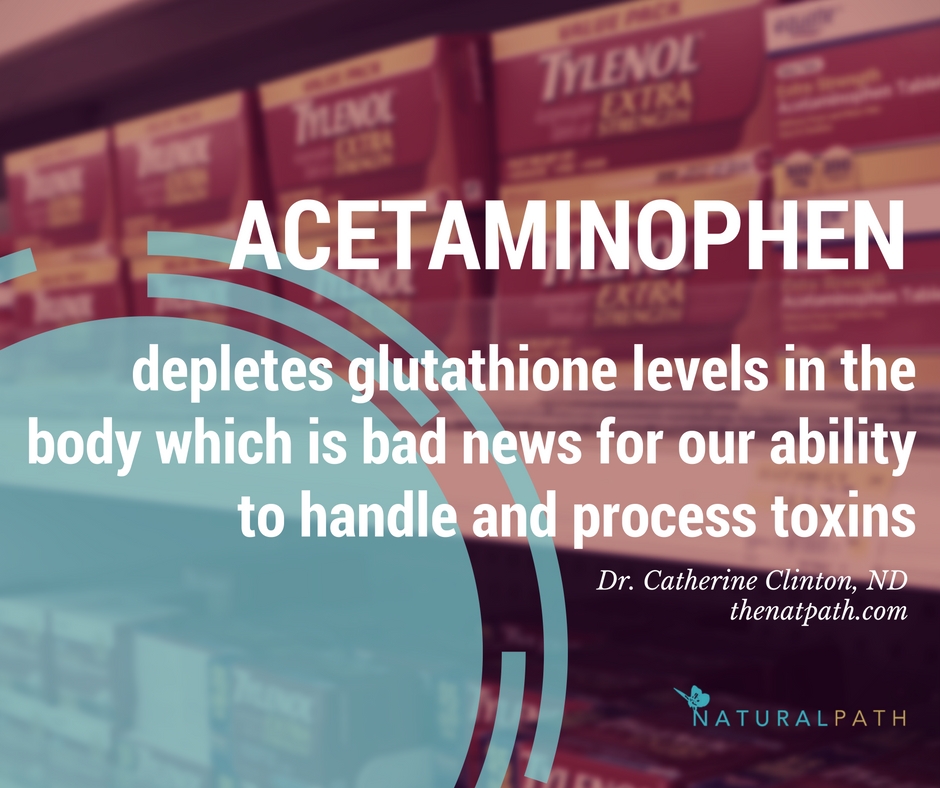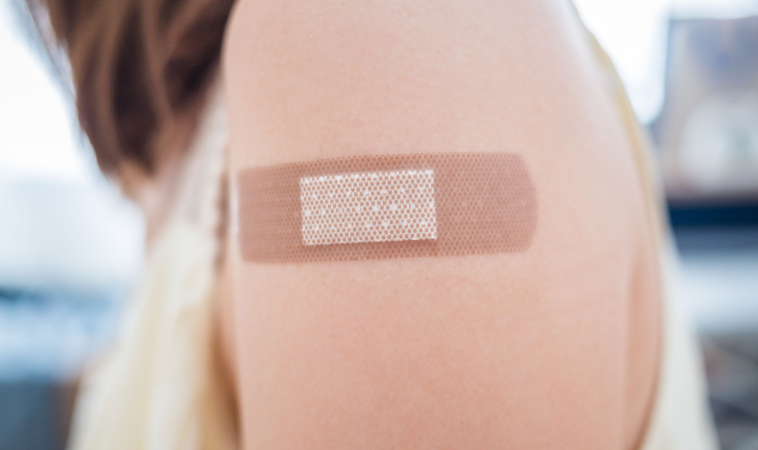Tylenol after childhood shots, or even before, is common advice to parents vaccinating their children. Tylenol has become synonymous with easing childhood pain and discomfort with the tagline the pain reliever hospitals use most. The idea is that the active ingredient in Tylenol, acetaminophen or paracetamol as it is called in Europe, acts as an anti-inflammatory agent and helps alleviate some of the side effects of vaccines like fever, injection site reactions and body aches. Far from helping, acetaminophen can cause damage and is something that should be avoided with vaccines altogether except in a very few select cases.
Acetaminophen Associated with Neurological Dysfunction in Children
 A 2008 study showed that acetaminophen use after childhood vaccinations was associated with an eight fold increase in autism disorder.[1] The study compared acetaminophen use after shots with ibuprofen use after shots but did not find the same association with ibuprofen use. Researchers first found this connection between increased acetaminophen use and autism when exploring the increased autism incidence in California with increased acetaminophen use in the United States and decreased acetaminophen use with decreased rate of autism in California. (2) The researchers also found similar increases in the rates of asthma associated with the usage of acetaminophen. They noted that the rates of autism incidence and asthma stopped increasing in the months following two recalls of acetaminophen laced with cyanide. (2) Research out of Europe has been finding the same association with acetaminophen and neurological changes. Studies out of Denmark and the Netherlands associate acetaminophen use in women during pregnancy with negative behavioral and brain development in their children.[2] [3]
A 2008 study showed that acetaminophen use after childhood vaccinations was associated with an eight fold increase in autism disorder.[1] The study compared acetaminophen use after shots with ibuprofen use after shots but did not find the same association with ibuprofen use. Researchers first found this connection between increased acetaminophen use and autism when exploring the increased autism incidence in California with increased acetaminophen use in the United States and decreased acetaminophen use with decreased rate of autism in California. (2) The researchers also found similar increases in the rates of asthma associated with the usage of acetaminophen. They noted that the rates of autism incidence and asthma stopped increasing in the months following two recalls of acetaminophen laced with cyanide. (2) Research out of Europe has been finding the same association with acetaminophen and neurological changes. Studies out of Denmark and the Netherlands associate acetaminophen use in women during pregnancy with negative behavioral and brain development in their children.[2] [3]
Researchers found:
“Although the central nervous system develops throughout pregnancy, the third trimester is a time of rapid brain growth and structural differentiation and this time might be especially sensitive to exposures affecting brain development. Although the cohort analysis of paracetamol use for 1–27 days found several effects on gross motor abilities, externalizing behaviour problems, and emotionality, the siblingcontrol analysis found effects on only poor gross motor development (corresponding to a RR of 1.21). This finding suggests that short-term use of paracetamol during pregnancy does not seem as harmful to the neurological development of the foetus. These findings are in line with previous studies, which found stronger effects after long-term exposure: 28 days for cryptorchidism,(7) most days/daily use for asthma(4) and high use in childhood for asthma.(27)”
With all these studies combined I think it is time to reconsider our use of acetaminophen in infants and children, especially in preparation for or recovery from vaccination.
Acetaminophen Depletes Essential Antioxidant Glutathione
Acetaminophen also depletes glutathione levels in the body which is bad news for our ability to handle and process toxins. Glutathione is a critical nutrient in the detoxification process that helps rid the body of toxins that we acquire in everyday life from our food, air, water and environment. The main enzyme of the glutathione detoxification pathway is inhibited by acetaminophen.[4] Acetaminophen use before or after shots will only decrease the detoxification system needed to help process some of the ingredients in the vaccine.
Acetaminophen is Counterproductive with Vaccinations
The side effects of shots that most parents give Tylenol or ibuprofen/NSAIDs for include fever, body aches/pain and irritability. These side effects occur because of the inflammation caused by the vaccine. When our body has an immune response to an infection or a vaccine there are a ton of inflammatory molecules that are produced. These inflammatory molecules recruit white blood cells to fight the infection, or vaccine agent in this case, and often produce a fever. This inflammation is needed to help signal the immune system to respond to the vaccine and have it be effective. Most fevers do not get high enough to need suppressing. Taking either acetaminophen or ibuprofen before shots lessens your body’s ability to respond to the vaccine.[5]
Researchers found that the body’s response to the vaccine was lessened with acetaminophen use:
“Antibody geometric mean concentrations (GMCs) were significantly lower in the prophylactic paracetamol group than in the no prophylactic paracetamol group after primary vaccination for all ten pneumococcal vaccine serotypes, protein D, antipolyribosyl-ribitol phosphate, antidiphtheria, antitetanus, and antipertactin. After boosting, lower antibody GMCs persisted in the prophylactic paracetamol group for antitetanus, protein D, and all pneumococcal serotypes apart from 19F.”
What Can You Do?
Make sure your doctor does not routinely give Tylenol or acetaminophen with childhood shots. Consider ibuprofen only after vaccination to help with the more severe vaccine side effects in your child. While fevers are a common side effect from vaccines and can be uncomfortable for children, it is best to let the fever run its course, rather than trying to suppress with acetaminophen or ibuprofen. Remember the increased temperature is essential for the body to mount the white blood cell defense against the infection, or vaccine antigen in this case. Only in cases of ibuprofen and/or other NSAIDs allergy should acetaminophen be considered. As a mom and as a doctor I error on the side of caution. It doesn’t make sense to stifle the immune responses to vaccination with pain relievers and with the additional risk acetaminophen poses, it is time to skip acetaminophen with shots in our children.
 Catherine Clinton ND, is a graduate of the National College of Natural Medicine (NCNM) in Portland, Oregon. She is a board licensed naturopathic doctor currently practicing at her private clinic in Eugene, Oregon.
Catherine Clinton ND, is a graduate of the National College of Natural Medicine (NCNM) in Portland, Oregon. She is a board licensed naturopathic doctor currently practicing at her private clinic in Eugene, Oregon.
Dr. Clinton is a speaker on integrative medicine and gut health and has authored several publications in those areas. She is founder of WellFuture, a line of nutritional supplements for infants and children that uses organic, whole food ingredients and the greenest, bioavailable nutrients.
When in medical school Catherine was diagnosed with an autoimmune disease that effects the gastrointestinal tract, leaving her with a special interest in autoimmune diseases and gastrointestinal conditions. Accessing how the multiple systems of the body are working together is a vital piece of Dr. Clinton’s practice. With a practice focused on gastrointestinal and immune health Dr. Clinton utilizes the latest in functional medicine combined with nutrition, herbal medicine and lifestyle interventions to treat a variety of digestive complaints, autoimmune diseases and pediatric conditions.
With the birth of her own children Dr. Clinton became passionate about the prevention of these chronic diseases and conditions by addressing the immune systems and gastrointestinal health of our children. Catherine is deeply committed to the optimal health of babies, children and families everywhere and loves to interact with her readers through her blog and social media. Her blog can be found at www.wellfuture.com/blogs/news
References:
- Schultz ST, Klonoff-Cohen HS, Wingard DL, Akshoomoff NA, Macera CA, Ji M. Acetaminophen (paracetamol) use, measles-mumps-rubella vaccination, and autistic disorder: the results of a parent survey. Autism.2008 May;12(3):293-307.
- Becker KG, Schultz ST. Similarities in features of autism and asthma and a possible link to acetaminophen use. Med Hypotheses. 2010;74(1):7–11.
- Zeyan Liew, MPH; Beate Ritz, MD, PhD; Cristina Rebordosa, MD, PhD; Pei-Chen Lee, PhD; Jørn Olsen, MD, PhD. Acetaminophen Use During Pregnancy, Behavioral Problems, and Hyperkinetic Disorders. JAMA Pediatr. 2014;168(4):313-320.
- Ragnhild Eek Brandlistuen, Eivind Ystrom, Irena Nulman, Gideon Koren and Hedvig Nordeng. Prenatal paracetamol exposure and child neurodevelopment: a sibling-controlled cohort study. International Journal of Epidemiology 2013;1–12.
- Rousar T, Parík P, Kucera O, Bartos M, Cervinková Z. Glutathione reductase is inhibited by acetaminophen-glutathione conjugate in vitro. Physiol Res.2010;59(2):225-32. Epub 2009 Jun 19.
- Prymula R, Siegrist CA, Chlibek R, Zemlickova H, Vackova M, Smetana J, Lommel P, Kaliskova E, Borys D, Schuerman L.Lancet.Effect of prophylactic paracetamol administration at time of vaccination on febrile reactions and antibody responses in children: two open-label, randomised controlled trials. 2009 Oct 17;374(9698):1339-50.
[1] http://www.ncbi.nlm.nih.gov/pubmed/18445737
[2] http://archpedi.jamanetwork.com/article.aspx?articleid=1833486
[3] http://ije.oxfordjournals.org/content/early/2013/10/24/ije.dyt183.abstract
[4] http://www.ncbi.nlm.nih.gov/pubmed/19537930/
[5]http://www.ncbi.nlm.nih.gov/pubmed/19837254
















